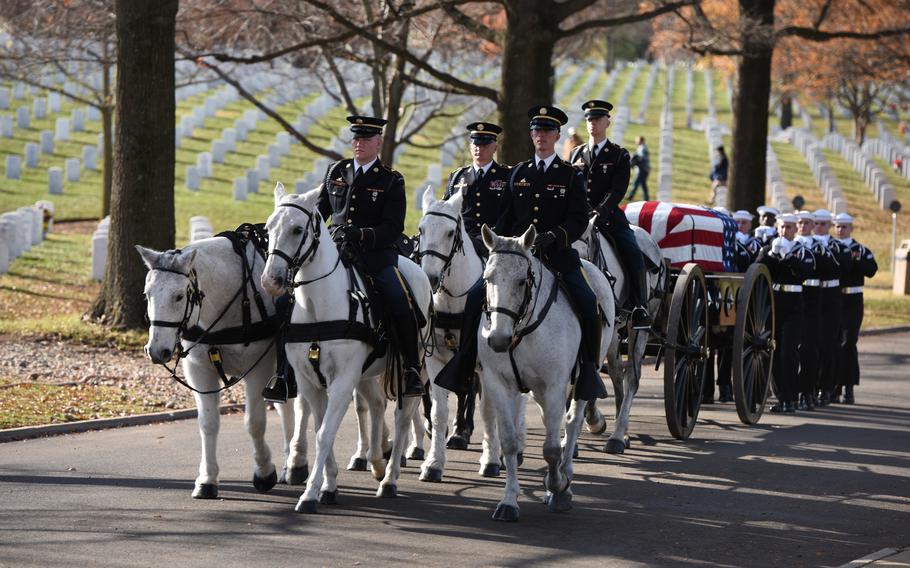
The caisson platoon of the Army’s 3rd Infantry Divison, also known as the Old Guard, leads a funeral procession in December 2016 at Arlington National Cemetery, Va. (Huey D. Younger Jr./U.S. Navy)
WASHINGTON — The iconic horse-drawn processions that have defined military funerals at Arlington National Cemetery for decades are on course to return after an 18-month suspension, under legislation included in the National Defense Authorization Act.
The Honoring Our Heroes with Dignity Act, sponsored by Rep. Vern Buchanan, R-Fla., was included as an amendment to the 1,800-page NDAA for fiscal 2025, which was approved this week by the House and Senate and will be sent to the White House for presidential signature soon.
Language in the bill instructs the Secretary of the Army to complete renovations of historic stables that had fallen into disrepair at Joint Base Meyer-Henderson Hall. The Army also must ensure that equine handlers are trained and certified to manage the herd and take other steps to establish safeguards for the horses’ welfare before caisson services can return.
Buchanan’s spokesman, Josh Gregory, said the congressman has not received an update from the Army on when those steps will be completed.
The horse-drawn processions have been an integral part of Arlington funerals for 75 years. Funeral escort honors at Arlington with horse-drawn carriages were reserved for retired commissioned and warrant officers, Medal of Honor recipients, service members killed in action, sergeants major, U.S. presidents and unspecified special designees.
But unsanitary living conditions, malnourishment and a lack of open space for the herd led to the suspension of horse-drawn funerals conducted by the 3rd Infantry Regiment Caisson Platoon in May 2023, according to Maj. Gen. Trevor Bredenkamp, commander of the Army Military District of Washington.
The horses were infested with parasites, crowded into small fields filled with manure and construction debris, and suffering from malnutrition from low-quality feed. Two horses died.
“The Army reported that the horses had very little grass in the field where they lived, causing many to consume sand and gravel which eventually caused the deaths of the two horses. In fact, one horse that passed away was found to have 44 pounds of gravel and sand in his gut,” Buchanan said in October, when he requested that the Government Accountability Office investigate the treatment of the horses.
Eighteen out of 64 horses were retired, according to Buchanan’s office. The Army has been using hearses from area funeral homes and other vehicles since the suspension of the caisson service.
“Caisson-pulling military horses were dying in 2022 because of the Army’s failure to provide proper food, veterinary care, pastureland and stables for the herd,” Rep. Morgan Luttrell, R-Texas, said at a recent hearing where the issue was discussed. “Our caisson platoon should be the most elite organization of its kind on the planet.”
The amendment for resuming the horse-drawn processions provides specific instruction that the herd must have four squads of 11 horses each. The horses’ health, fitness and training must be certified by the military in consultation with veterinarians and equine experts.
The Army may resume limited services before the conditions are fully met if it can attest to the health and sustainability of the herd and notifies congressional armed service committees in advance, according to the legislation.
More than 2,000 military funeral honors with escort services have been scheduled since the suspension of caisson operations, according to Arlington National Cemetery. During that time, 34 families opted to wait for the return of the caisson, which represents 1.7% of the total number of scheduled military funeral honors with escort services, according to the cemetery.
The herd, meanwhile, is being kept on pastureland in Virginia as the Army seeks to acquire permanent land for the horses to graze and exercise when they are not working at Arlington, according to testimony at a hearing last month of the House Veterans’ Affairs Committee subpanel on disability and memorial affairs.
The Army has surveyed several potential sites and submitted recommendations to the Army Corps of Engineers real estate division, which would handle the purchase, according to an Army official who spoke on the condition of anonymity.
Buchanan and Rep. Earl Blumenauer, D-Ore., asked the GAO in October to investigate mismanagement of the Army’s 3rd Infantry Regiment’s Caisson Platoon. The GAO has not committed to a timeline for the report, according to Buchanan’s office.
The lawmakers would like the GAO to determine the steps the Army is taking to improve the herd’s living conditions and the factors that contributed to the horses’ maltreatment and deaths. As part of the audit, the GAO should recommend criteria for a facility to house the horses and outline the type of training that handlers need to properly manage herd, the lawmakers said.